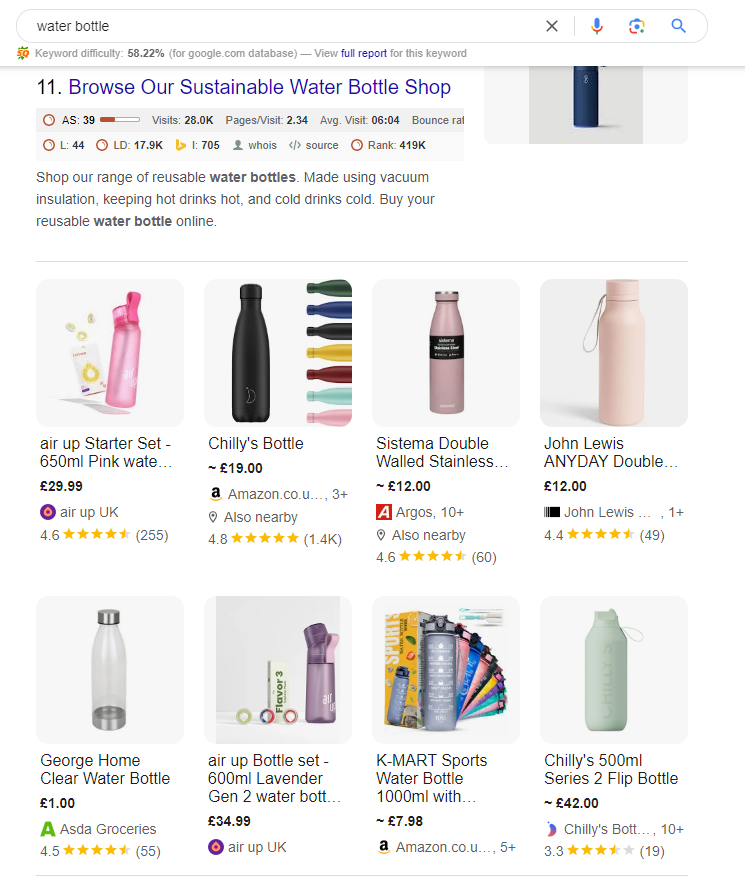In digital marketing, there’s always a dense jargon or menacing acronym – but what is the key value proposition of PPC campaigns? In this article, we’ll tell you what Google search campaigns can do for your business. We’ll also aim to explain how – beyond raising brand awareness – they generate real value for money. Curious about search marketing campaigns for your business? Or are you a marketer interested in some general knowledge? Either way, let’s delve in to the world of PPC!
What Is The Key Value Proposition of PPC Campaigns?
Search campaigns offer you a variety of advantages compared to other marketing platforms. There are many key value propositions that go into PPC campaigns:
-
Targeted Marketing: Most ad platforms are quite general. Search lets you choose specific keywords to go after. This gives you unparalleled control over where and to who your ads appear. No more wasted clicks!
-
High Intent Audiences: With keyword targeting comes intent. Search allows your ads to show to people already looking for your product or service. These customers are much easier to engage and, more importantly, convert.
-
Unmatched Customisation: As a platform, Google Ads is all about variety. Looking to boost your performance in the shopping tab? Want to write a search ad for a specific product name? All this and more is possible.
-
Great Reach & Visibility: There are 8.5 billion Google searches every day. Advertising through Google lets you tap into that massive market share. Through their platform, you’re reaching the single largest online customer base.
-
Adaptive & Scalable: You set the budget and the bids. Don’t want your ad to run at a specific time of day? Want to pay less if it does? Google offers extensive control over where and how your ad shows up. Your Google Ads campaigns scale to a level you can work with.
-
Measurement & Analytics: Through Google Ads, there’s a suite of great performance metrics. Whether it’s conv. value/cost (for ROI), conversion value or engagement metrics like clicks. You can draw on their suite of stats to improve your performance.
Campaigns For All Businesses
Google Ads has evolved far beyond the days of plain old text ads below search results. A wide variety of retailers benefit from getting in on search engine marketing. Google offers new additions like shopping ads.

By running a shopping campaign through Google Ads, you advertise products directly. All under the same targeted parameters of a regular search ads campaign. If you’re an ECommerce set up wondering what PPC does for you? Shopping campaigns are the answer.
Don’t Be Left Behind
If you’ve read this far, you’re likely already considering a PPC campaign. If we haven’t already sold you on the value propositions, though, what about the negatives?
Google is inevitable. That’s one of the maxims of any business with an online presence. You want your site ranking well organically in search terms for reliable business. But what if competitors have already made PPC investments themselves?
Everything – from advertising on a competitor’s brand name to the keywords you rank highly for organically – is fair game. It’s possible that, with a capable PPC campaign, your competitors are able to counter your best SEO.
The ultimate value proposition of a PPC campaign is this: it lets you stay ahead. You can shield your brand keywords, counteract competitors, and even return the favour. Search is a high traffic space, and it’s therefore a very competitive space.
It’s important to get a foot in PPC before someone else in your industry does.
Value For Your Money
When we say Google Ads is ‘scalable’, what do we mean, really? PPC stands for pay-per-click. It’s as simple as it sounds: you only send money to Google when someone clicks through on your ad.
You get better value for your money than traditional advertising. There you pay a flat rate with no guaranteed engagement. Through search engines, when you’re paying, you’re paying for a potential customer.
How do you get your ads to the top? Google runs an auction on every keyword. You and your competitor declare how much you’re ready to pay per click for it. But the winner doesn’t pay the full amount they declared.
For example:
Your competitor says they’re willing to pay £1.00 per click for the keyword ‘Liverpool plumbers’
You say you’re willing to pay £1.50 for the same keyword.
Then you would pay £1.01 for the keyword.
You always end up paying the bare minimum to beat a competitor’s bid.
Getting Started With PPC
Now that you know the key value proposition of PPC campaigns, are you looking to get started? You can read our article about getting started with Google Ads here.
However, in short:
-
Keyword research: Identify keywords relevant to your service, brand or product. Prioritise which you think are most desirable for bids.
-
Audience research: Figure out the demographics, devices and time frames relevant to you. Your audience can be highly targeted through Google Ads. This should influence your bids and modifiers.
-
Copywriting: Produce your ad copy. Bear in mind that Google Ads has strict character limits – 30 for headlines and 90 for descriptions. Optimise accordingly.
-
Optimisation: Once your campaign is up, the work doesn’t stop! Use metrics and analytics to judge performance. Correct where things are slipping. Keep an eye on search terms and spend.
This is very general outline of what you should be prioritising going into a Google Ads campaign. Keep in mind that a PPC campaign is a long-term commitment. It needs continuous management. You can’t just set it up and leave it running – you’ll rack up the bill!
To keep your ads efficient and saving money in the ever-shifting landscape of Search? It takes an informed PPC knowledge and an eye for metrics and trends that govern Google.
Want Help With Your PPC Ads?
Measured Marketing can help! We’re a specialist PPC marketing agency. Our team has over 15 years of experience in the industry. We’ve helped campaigns across multiple industries.
Want to talk to us about PPC campaign management? Contact us today!

